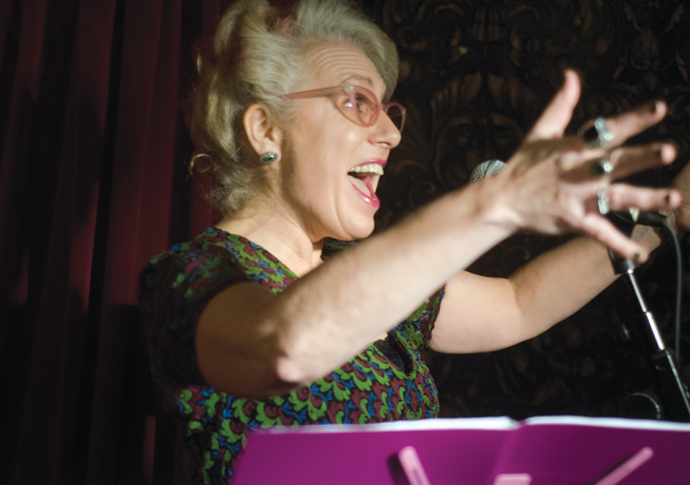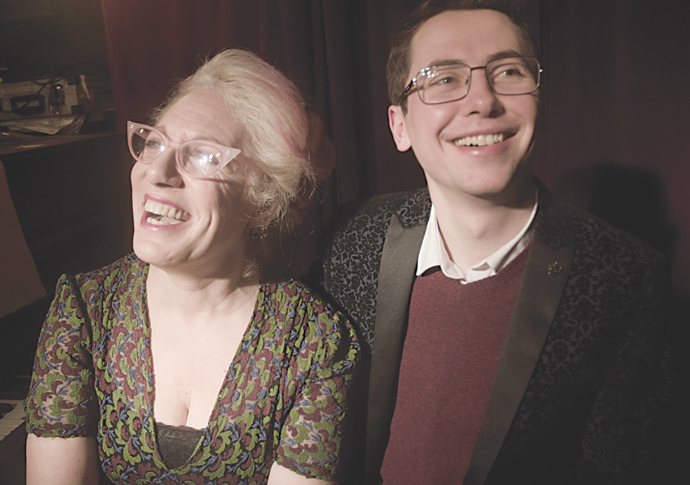Lady sings the (bawdy) blues
Dan Carrier meets singer Suzanne Noble as she revives a genre of song once considered much too rude for polite company
Thursday, 26th September 2019 — By Dan Carrier

Suzanne Noble
THEY were known as the Bawdy, or Dirty Blues: a genre of rasping, jazzy numbers with close-to-the-bone lyrics that were far too rude for the sensitive ears of radio censors, big concert hall promoters and mainstream labels of the 1920s and 30s – but were perfectly suited to the speakeasies, brothels and independent record producers of Chicago and New York.
Their suggestive lyrics and rhythm meant they were not easily archived and catalogued, and because of this have been widely forgotten.
Now Kilburn-based, New York-born singer Suzanne Noble is on a mission to rediscover and share these forgotten songs that date from a key period in the development of popular music.
Her show, Bawdy Blues Suz and Gorgeous George, is on at the Green Note in Parkway, Camden Town, next week.
“Who wants to sing about love, anyway?” Suzanne jokes.
As a singer, she is steeped in the historic sounds of New York, coming from a family of musicians. A cousin drummed for Janis Joplin, another relative was jazz musician Stan Getz. Music is in the blood – but singing is something she is returning to after decades away from performing.
Suzanne had worked professionally in her teens and in her 20s, working as a session artist and in bands. But after starting a family, having two children, she stopped singing – until her interest was re-ignited with the help of a piece of musical social history. Two years ago, she saw singing coach Nikki Lamborne perform in a band called Never The Bride.
“I sat back and watched this 50-something woman with just a massive rock voice,” she recalls.
Impressed, she spoke to Nikki after the gig.
“I realised quite how much I missed singing. I told her I loved her sound. As a woman, it is quite common for your voice to drop as you get older. I had lost my range and it meant I felt like I had really lost my confidence. I thought I would never sing again.”

Suzanne with pianist George Webster
Nikki said she could help with a bit of coaching – and so Suzanne took a deep breath and began once more. After a few sessions, Nikki told Suzanne she was playing at the Camden Town venue the Blue Note and suggested she did a couple of songs.
And it was here the idea of a Bawdy Blues show began.
“I’d been singing songs from an album I had bought in my 20s called Copulating Blues. I had picked it up from a record store on a weird independent label,” she recalls.
“The songs are not super difficult, and they suited my voice. I did a couple.”
She was invited back to have a show of her own, so she worked with pianist George Webster on arrangements and the pair have created a repertoire that features a number of classic, cheek-reddening, “lost” songs.
Among the musicians who recorded songs she covers is the legendary Bessie Smith – known as the Empress of the Blues – who died in a Mississippi car accident in October 1937.
“I do a historical narrative around the songs I have chosen,” Suzanne says, giving the audience an insight as to how each one was written and performed.
“There are some people who are less familiar in my set, but are up there with the likes of Bessie Smith.
“For example, Ethel Waters and Alberta Hunter were well known then. Discovering their stories brings the music to life,” she adds.
“Many of the singers of Bawdy Blues had been on similar journeys. Many of the blues singers who made a living in New York or Chicago had come from the South – areas of segregation such as Tennessee and Mississippi.
“It earned its name because of where they worked: the music sung in speakeasies and brothels, and there is a lot of sexual innuendo in it. They were meant to get you in the mood. One of the things I really like about it is it is music about women proclaiming what they want, and how they want it. Consider how music is today, in male-dominated genres like hip hop. This is so very different – and of course it was pretty outrageous stuff back then. This meant it wasn’t played on the radio – which meant it could get dirtier and dirtier, but also means it has disappeared, to a degree.
“For example, there was a singer called Lil Johnson. She was brilliant – yet we don’t know much about her after 1937. She did a song called Press My Button, Ring My Bell, which was widely known. You can imagine what that was about.”
With tunes boasting names such as King Size Papa, Long Slidin’ Thing, If I Can’t Sell it (I’ll Keep Sitting on it), this is a piece of underground musical history that has long lain dormant. Now, 90 years on, the music is discovering a new audience via the work of Bawdy Blues Suz and Gorgeous George.
• Green Note Basement, Thursday October 3, 8pm, £10, 020 7485 9899, www.greennote.co.uk/productionsuzanne-noble/